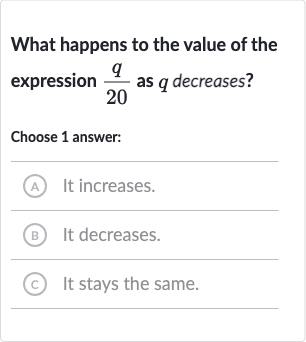Full solution
Q. What happens to the value of the expression as decreases?Choose answer:(A) It increases.(B) It decreases.(C) It stays the same.
- Analysis of the expression: Let's analyze the expression . This is a direct proportionality between and the value of the expression. As changes, the value of the expression will change in the same direction because the denominator, , is a constant positive number.
- Effect of decreasing : Now, let's consider what happens when decreases. Since is in the numerator, if we decrease , the overall value of the fraction will also decrease. This is because we are dividing a smaller number by the same positive constant.
- Confirmation through example: To confirm our reasoning, we can think of a simple example. If decreases from to , the value of the expression changes from to . Clearly, the value of the expression has decreased.
More problems from Transformations of absolute value functions: translations and reflections
QuestionGet tutor help
QuestionGet tutor help
QuestionGet tutor help
QuestionGet tutor help
QuestionGet tutor help
QuestionGet tutor help
QuestionGet tutor help

